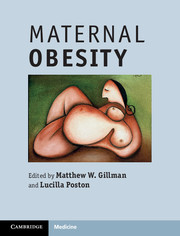Preface
Published online by Cambridge University Press: 05 August 2012
Summary
Preface
The obesity pandemic has spread to every part of the globe, and women of reproductive age are not immune. Obese women have reduced fertility, but when they do become pregnant, the subsequent adverse effects accrue to both mother and child.
The obese mother may develop pregnancy complications such as gestational diabetes, she may present challenges to obstetric care, and especially if she gains excessive amounts of weight during pregnancy, may develop ever-increasing weight and its sequelae over her lifetime. Should she become pregnant again, the pattern is repeated. Her offspring have an increased risk of becoming obese themselves. If the offspring is female, she is likely to enter her own pregnancy at increased weight, thereby spawning an intergenerational vicious cycle of obesity and its complications. Interrupting these cycles is of utmost public health importance.
Maternal Obesity will take you through the evidence underlying these concepts. We have divided the book into i ve sections, starting with trends and determinants of obesity in women of reproductive age. h e next two sections appraise the evidence for short- and long-term outcomes in both mother and child. h e chapters in these sections include animal and human data, and they range from the basic science of adipose tissue to long-term epidemiologic observations. h e fourth section reviews the burgeoning literature on interventions to reduce the complications associated with maternal obesity. h e i nal section contains chapters on clinical management and public health policy.
- Type
- Chapter
- Information
- Maternal Obesity , pp. xi - xiiPublisher: Cambridge University PressPrint publication year: 2012



